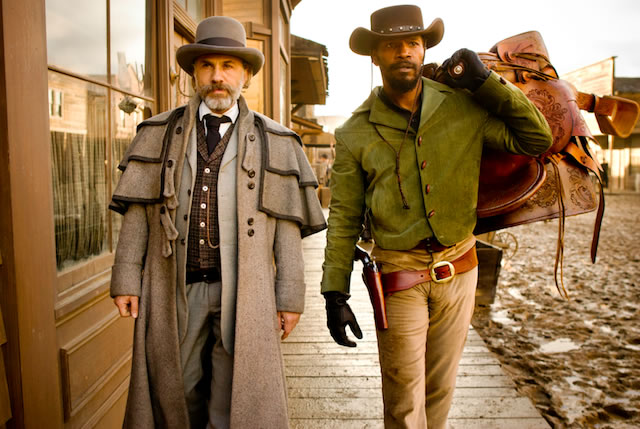Quentin Tarantino’s Django Unchained is a complete masterpiece. The actors, screenplay, cinematography and direction are near perfection. Is the film violent? Yes. Is it controversial? Yes. Is it one of the year’s best? Yes.
Django is two hours and 35 minutes long and every minute is necessary in this unbelievable story in which Tarantino pays homage to spaghetti westerns and the 1966 film titled Django, starring Franco Nero, who makes a cameo in this film.
Django Unchained is set in the South, two years before the Civil War. Django (Jamie Foxx) is a slave whose brutal past has brought him face to face with a German-born bounty hunter, Dr. King Schultz (Christoph Waltz). Dr. Schultz is looking for his next bounty, the horrific Brittle brothers, who used to own Django and his wife Brunhilde (Kerry Washington). Knowing that only Django can lead him to the Brothers, Dr. Schultz frees Django and ends up “recruiting” him as his co-partner in bounty hunting.
However, Django’s ultimate goal is to find Brunhilde, since the two were separated in a slave trade years ago. Dr. Schultz agrees to help him find her and after some research it leads the two of them to Calvin Candie’s (Leonardo DiCaprio) plantation, named “Candyland.” Django and Dr. Schultz arrive at Candyland under false pretenses and end up instigating suspicions involving Candie’s lead house slave, Stephen (Samuel L. Jackson).
Tarantino’s dialogue is fluid and fantastic, and the actors are great at reciting his lines. His use of racial slurs will certainly bother some, but this is a Tarantino movie after all, and cursing is nothing new for the screenwriter and director. Tarantino shows the ugliness of racism by creating the most disgusting slave owners imaginable. There are scenes that absolutely horrifying to watch, making Django not for the faint of heart. Much blood is shed in the usual Tarantino fashion, splattering all over the place, including the cameras from time to time.
DiCaprio gives one of the best performances of the year as the wicked slave owner Calvin Candie. We’ve never seen him in a role quite like this before, and this may be the year DiCaprio takes home his first Oscar. His portrayal of the slave owner is flamboyant, humorous and horrible. There is one scene in particular where DiCaprio uses Tarantino’s well-crafted dialogue to showcase Candie’s sinful heart. It’s also some of Tarantino’s best dialogue to date.
Christoph Waltz, who is not shy to playing a Tarantino character (he won the Academy Award for his role in “Inglourious Basterds”), is perfection as Dr. Schultz, a man who despises slavery with all his might. His goofy, elevated accent plays very well onscreen, making him the most enjoyable character to watch in “Django.”
The cinematography by Robert Richardson (“Hugo” & “Inglourious Basterds”) is breathtaking. Between the gorgeous shots of the mountains and the picturesque plantations of the South, the film looks beautiful.
Underneath the violence, bloodshed and racial slurs, Django is ultimately about a love story and what one man will do in order to be reunited with his wife. That’s what makes Tarantino’s film so enjoyable and real. What Django does in order to see Brunhilde again is unbelievable and astonishing. Although you may not think it from the trailers, Django Unchained is really one of the most romantic films of the year. Call me crazy AFTER you watch the film.
There will be some who think Django Unchained goes too far with its message, but that is the brilliance of Tarantino’s “no shame” screenplay. If you are willing to accept the film’s “over-the-top” demeanor, you’ll find that Django Unchained is one of the best movies of the past decade.

COMMENTS
Please let us know if you're having issues with commenting.